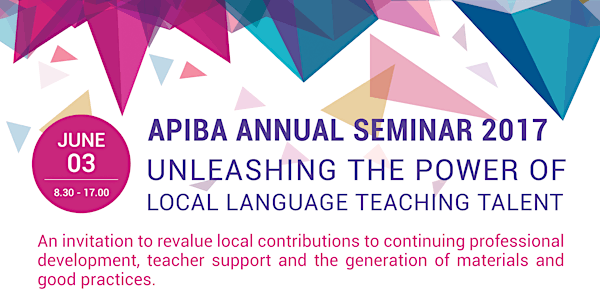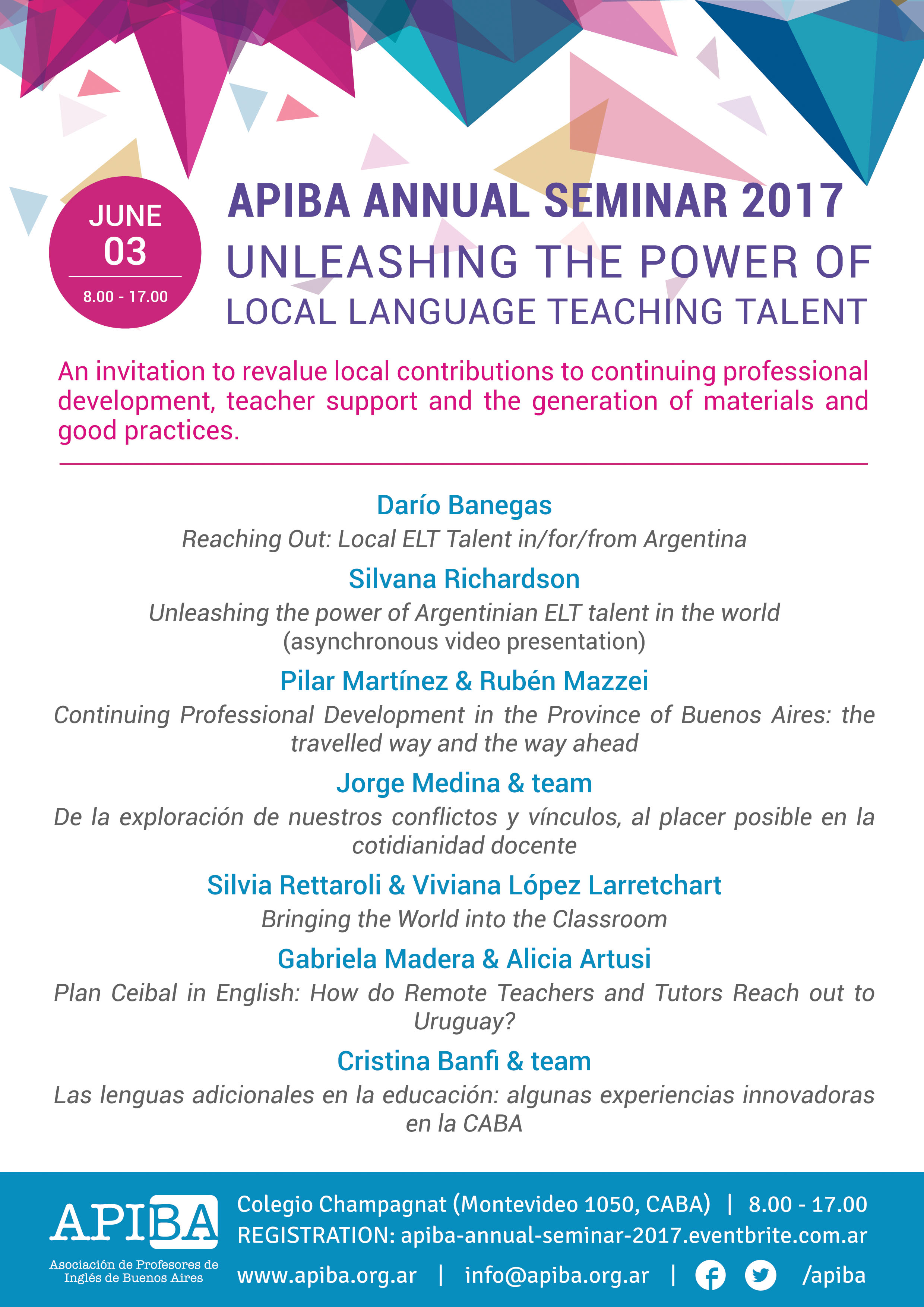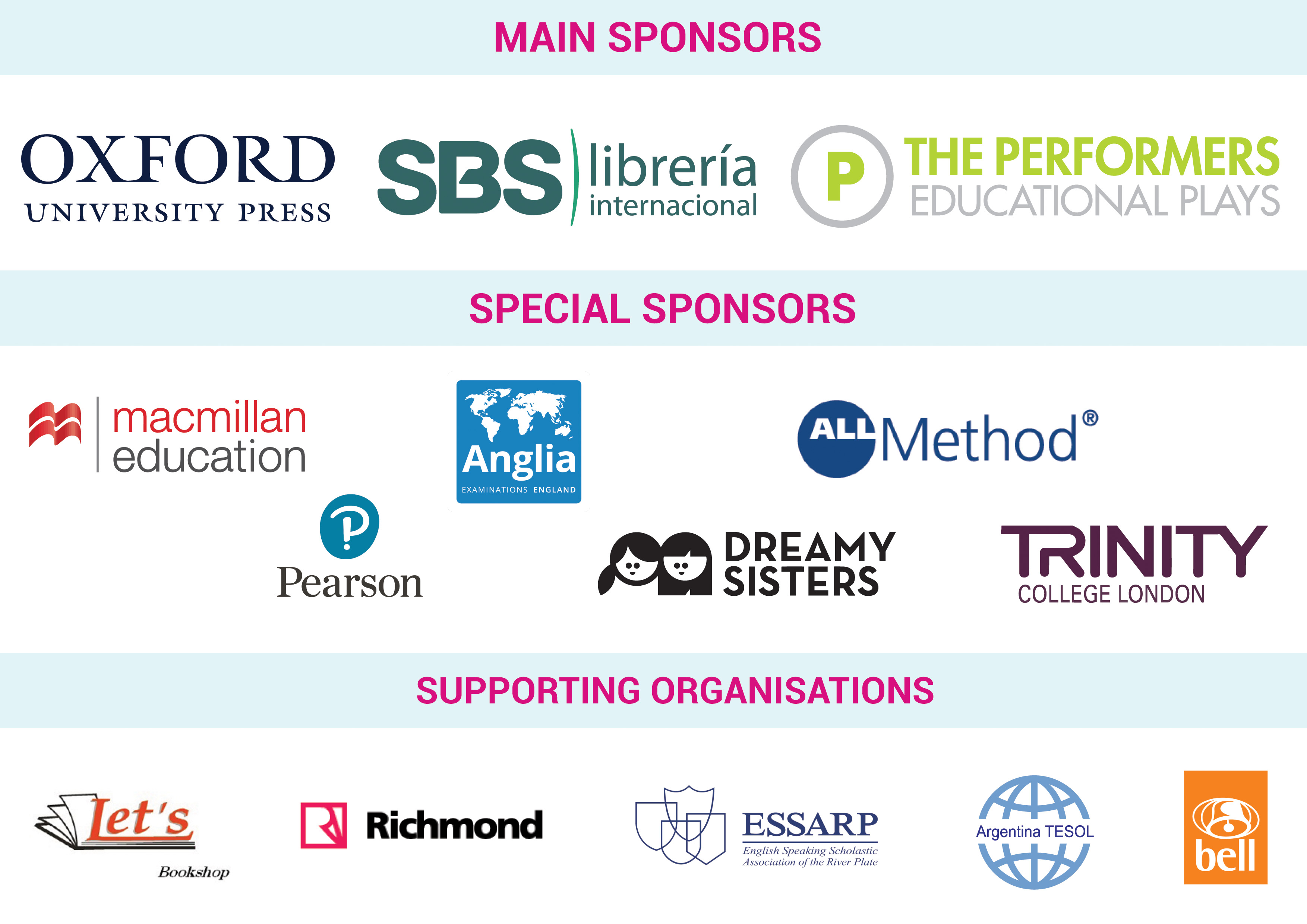
APIBA Annual Seminar 2017: "Unleashing the Power of Local Language Teaching Talent"
Date and time
Location
Colegio Champagnat
Montevideo 1050 Buenos Aires, CABA C1019ABV ArgentinaRefund Policy
Description


SCHEDULE
08.00 - 08.45: REGISTRATION
08.45 - 09.00: OPENING CEREMONY
09.00 - 10.15: PLENARY. Darío Banegas: Reaching Out: Local ELT Talent in/for/from Argentina
10.15 - 10.30: Silvana Richardson: Unleashing the power of Argentinian ELT talent in the world (asynchronous video presentation)
10.30 - 11.00: COFFEE BREAK
11.00 - 11.45: Pilar Martínez & Rubén Mazzei: Continuing Professional Development in the Province of Buenos Aires: the travelled way and the way ahead
11.45 - 12.30: Jorge Medina & team: De la exploración de nuestros conflictos y vínculos, al placer posible en la cotidianidad docente
12.30 - 14.00: LUNCH
14.00 - 14.45: CONCURRENT SESSIONS
1. Silvia Rettaroli & Viviana López Larretchart: Bringing the World into the Classroom
2. Gabriela Madera & Alicia Artusi: Plan Ceibal in English: How do Remote Teachers and Tutors Reach out to Uruguay?
14.45 - 15.30: Cristina Banfi & team: Las lenguas adicionales en la educación: algunas experiencias innovadoras en la CABA
15.30 - 16.00: COFFEE BREAK
16.00 - 16.45: DISCUSSION PANEL: So where are we and where can we go? Moderator: TBC
16.45 - 17.00: RAFFLES
PRESENTATIONS & SPEAKERS' BIODATA
Darío Luis Banegas: Reaching Out: Local ELT Talent in/for/from Argentina
What do we mean by local ELT talent? Where are they? Who are they? What do they do? Are we good at promoting and encouraging new generations of teacher educators and presenters? To what extent do we include local ELT talent in our professional practices? What does local talent do to share experiences and expertise? What can we do better? How can we reach out? In this opening plenary, I will address some issues and practices and suggest ways in which we can unleash and sustain the power of ELT professionals across Argentina and make our voices heard in the continent and beyond.
Darío Luis Banegas, PhD (APIZALS member and president) is an associate fellow at the University of Warwick, and teacher educator and curriculum developer with the Ministry of Education of Chubut. He is a visiting lecturer at universities in South America, the UK and Spain. He has just published a book on initial English language teacher education with Bloomsbury. Darío is the president of APIZALS (Asociación de Profesores de Inglés, Zona Andina y Línea Sur) and the founding editor of AJAL (Argentinian Journal of Applied Linguistics). His main areas of interest are: CLIL, initial language teacher education, and action research. He lives in Esquel, Chubut, Argentina.
Silvana Richardson: Unleashing the power of Argentinian ELT talent in the world (asynchronous video presentation)
Argentinian ELT teachers and teacher educators are well-known in the international ELT arena for their professionalism and expertise. And yet, only few of us venture into the world of international conferences, web conferences and published academic work. How can we develop our confidence to increase our representation and speak out with a distinctive voice? What can teacher training colleges, teachers’ associations and other organisations do to unlock, support and nourish local talent?
Silvana Richardson (MA, DELTA, PGCE) is a graduate teacher from the I.S.P. “Joaquín V. González,” where she specialised in Methodology. She is Head of Teacher Development at Bell Educational Services, Director of Studies at Bell Teacher Campus, Cambridge, Programme Quality Manager at the Bell Foundation, and Quality Assurance Inspector. She has trained teachers, teacher educators and academic managers in the state and private sectors in the UK, China, Saudi Arabia, Albania, Spain and Argentina, is a well-known speaker at international conferences and has recently co-authored a white paper with Scott Thornbury for CUP. Her main areas of interest are evidence-informed approaches to CPD, Teacher Research, EAL and Equity in TEFL. She lives in Cambridge, England.
Pilar Martinez & Rubén Mazzei: Continuing Professional Development in the Province of Buenos Aires: the travelled way and the way ahead
Continuing Professional Development for teachers of English in the province of Buenos Aires from 2005 to date has moved from theory-based approaches to teacher inquiry-based approaches. In this presentation we will share the different stages of CPD in our local context and the challenges we face, as CPD coordinators, to produce the correct synergy between educational policies and the CPD courses and mentoring we design so that they have a good impact on both teachers and their students.
Rubén Mazzei is a university English and literature teacher and a sworn translator (Universidad Nacional de La Plata). He teaches at different levels, and is a researcher for Universidad de Buenos Aires. He coordinates the CPD programme for Dirección de Formación Continua, Province of Buenos Aires, and is also an oral examiner for Cambridge University and has facilitated workshops for the British Council.
María del Pilar Martínez (APIBA member) has been a tertiary and university English and Literature teacher for more than 25 years. She coordinates the CPD programme for Dirección de Formación Continua in the Province of Buenos Aires. She holds a postgraduate degree from University of Buenos Aires and a specialisation degree from OIA. She has written several articles on ELT.
Jorge Medina y equipo: De la exploración de nuestros conflictos y vínculos, al placer posible en la cotidianidad docente
Se presentará la experiencia del “Ateneo Permanente de Problemas de la Práctica Docente”, que desarrolla el dispositivo psicodramático-lúdico-expresivo (P.L.E.). Este espacio ha sido distinguido con el Premio “Paulo Freire” en 2014 por el MERCOSUR, como experiencia innovadora de formación docente. El dispositivo P.L.E. posibilita una elaboración de los problemas, conflictos y vínculos del docente, desde los planos cognitivo, afectivo, corporal y sensorial, abriendo nuevos caminos a la creatividad, a potencias ignoradas y al placer en la cotidianidad docente.
Jorge Medina es Licenciado y Profesor en Ciencias de la Educación, Psicodramatista y Coordinador de Recursos Expresivos. Investigador y Capacitador de numerosos cursos, talleres y seminarios de formación docente. Autor del libro “El malestar en la pedagogía. El acto de educar desde otra identidad docente” (NOVEDUC) y de variados artículos y ponencias en la materia.
Mariana Goldman es profesora de inglés egresada del I.E.S. en Lenguas Vivas "Juan R. Fernández". Docente de inglés y tutora en el nivel medio de la Escuela de Teatro N°1 D.E. 20 y maestra especial de inglés de la Escuela Primaria de Adultos y Adolescentes N°17 D.E. 20, "Carlos Morel". Miembro fundador del “Ateneo Permanente de Problemas de la Práctica Docente.”
Valeria Plou es profesora de inglés y traductora técnico-científico y literaria egresada del I.E.S. en Lenguas Vivas "Juan R. Fernández". Ejerce en los niveles medio y primario de la misma institución. Utiliza técnicas dramáticas en la enseñanza del inglés para facilitar el aprendizaje. Miembro del “Ateneo Permanente de Problemas de la Práctica Docente” desde sus comienzos.
Viviana López Larretchart & Silvia Rettaroli: Bringing the World into the Classroom
Taking risks and being innovative are important ways to go about teaching and learning. They are undoubtedly two of the skills our 21st century students need to develop. Becoming global citizens capable of engaging in collaborative and cooperative projects with people from the rest of the world is another key skill our students need for the future.
The project called "Bringing the World into the Classroom" invites classes to participate in a variety of global experiences. It is a telecollaborative intercultural project which promotes interaction among schools from different parts of the world, by taking part in online synchronous meetings via Skype or Google Hangout, as well as by participating in collaborative wikis and blogs. During the meetings, students play games, tell stories, engage in research tasks, solve problems, interview writers and experts or participate in global working teams with the purpose of achieving a certain goal decided upon beforehand by the teachers involved.
By engaging our students in enriching and inspiring tasks which enhance cross-cultural learning while developing their language and digital skills we aim at developing intercultural competence as well as exploring innovative and challenging teaching practices.
Viviana López Larretchart is a school primary head at a bilingual school in the Province of Buenos Aires, and an innovative educator with a focus on intercultural education and on the preparation of students for life in the 21st century. She has participated in national and international conferences. Her main areas of interest are: professional development, intercultural education and bilingual education.
Silvia Rettaroli (APIBA member) is a teacher and teacher educator. She has worked in the Research and Educational Development Unit of the MEyC (1998-1999). She has been a CLE coordinator (Foreign Languages Certification, 2008-2011), an English Unit coordinator at the CLE (Ministry of Education of the City of Buenos Aires, 2011-2016) and NES Curriculum Designer (2014-2015). She has organised and participated in national and international conferences, published papers and textbooks. Her main areas of interest are: professional development (OL and f2f), bilingual education/CLIL and assessment. She was an Executive Committee member at APIBA in 1991-2001 and 2002-2006.
Gabriela Madera & Alicia Artusi: Plan Ceibal in English: How do Remote Teachers and Tutors Reach out to Uruguay?
Within the highly innovative programme Plan Ceibal en Inglés, whose aim is to reach state-run primary school children in all corners of Uruguay by means of remote teaching, classroom teachers learn the language through a self-access course with the help of e-moderators. However, most of the Uruguayan classroom teachers who participate have very little knowledge of English. How do they manage to deliver two lessons per week? This session will focus on this aspect of the project.
Gabriela Madera (APIBA member) is a graduate from I.S.P. “Joaquín V. González” and has a degree in Education from Universidad Nacional de Quilmes. She is Head of English at Buenos Aires English High School, where she has worked for more than 20 years. In 2011, she started working as an online tutor for the British Council and is currently Academic Tutor Coordinator for Plan Ceibal en Inglés, Uruguay. She has been a member of APIBA since 2001 and she was an Executive Committee member in 2010-2012.
Alicia Artusi (APIBA member) is a Teacher of English Language and Literature graduated at Universidad Nacional de La Plata, and holds a MAPDLE (MA in Professional Development in Language Learning) with NILE and the University of Chichester, U.K. She’s the co-author of Engage among other course book series, published by OUP, UK. She’s currently working as Quality Manager Argentina for Plan Ceibal en Inglés.
Cristina Banfi y equipo: Las lenguas adicionales en la educación: algunas experiencias innovadoras en la CABA
La Dra. Banfi, Gerente Operativa de Lenguas en la Educación, y parte de su equipo presentarán algunas de las novedades en educación en relación a la enseñanza de lenguas adicionales que se están implementando en la CABA, tales como las certificaciones que otorga la CABA ligadas a los distintos tipos de trayectos formativos en lenguas adicionales en la NES, la escuela de inmersión dual argentino-china, y el programa ELSI (Español Lengua Segunda para la Inclusión).
La Dra. Cristina Banfi (miembro de APIBA) es profesora graduada del I.E.S. en Lenguas Vivas "Juan R. Fernández.” Es Magíster (MPhil, University of Cambridge) y Doctora (PhD, University College London) en Lingüística. Ha enseñado en instituciones educativas en todos los niveles, desde inicial a superior. Ha organizado y participado de conferencias internacionales, publicado papers y libros y editado revistas académicas. Fue presidente de APIBA (dos mandatos), Directora del Departamento de Lenguas en la UCA y Coordinadora del Área de Relaciones Internacionales en la CONEAU (Comisión Nacional de Evaluación y Acreditación Universitaria). Actualmente, es Directora de la Gerencia Operativa de Lenguas Extranjeras del Ministerio de Educación de la Ciudad de Buenos Aires, y profesora y capacitadora en instituciones de nivel superior. Sus principales áreas de interés son gestión e investigación educativa, desarrollo profesional, lingüística teórica y aplicada, y educación bilingüe.
Sandra Revale (miembro de APIBA) es profesora de inglés y Licenciada en Educación. Actualmente se desempeña como Coordinadora de Enseñanza de Idiomas en la Gerencia Operativa de Lenguas en la Educación del Ministerio de Educación de la Ciudad de Buenos Aires. Enseña Didáctica Específica en el ISP “Dr. Joaquín V. González” y ha dictado cursos de desarrollo profesional y participado en numerosos congresos y jornadas. Recientemente participó en la elaboración de los Diseños Jurisdiccionales de los Profesorados de Lengua Extranjera, en el diseño de la Orientación en Lenguas de la Nueva Escuela Secundaria, y en la redacción de las bases curriculares para la Escuela de inmersión dual argentino-china. Fue presidente de APIBA (2003-2005) y miembro de Comisión Directiva (2000-2003).
Lucía Baigorrí Haüen es profesora de inglés egresada del I.S.P. "Joaquín V. González." Se ha desempeñado como docente en escuelas primarias y secundarias de la Ciudad de Buenos Aires y como asistente de español en la Universidad Willamette a través de una beca Fulbright. Actualmente se está especializando en interculturalidad y la enseñanza del español como lengua segunda y extranjera (I.E.S. en Lenguas Vivas "Juan R. Fernández") y es parte del equipo ELSI de la Gerencia Operativa de Lenguas en la Educación, Ministerio de Educación de la Ciudad de Buenos Aires.
Evelia Romano es doctora en lenguas y literaturas hispánicas por la Universidad de California en Santa Bárbara. Tiene una amplia trayectoria relacionada con distintos aspectos de la literatura y la enseñanza de segundas lenguas. Entre sus publicaciones más recientes, es la compiladora de Enseñar español a sinohablantes, reflexiones teóricas, propuestas prácticas (Buenos Aires, ed. Hub, 2013). En la actualidad, trabaja como asesora de bilingüismo en la escuela bilingüe argentino-china de la ciudad de Buenos Aires, y en el área de Español Lengua Segunda para la Inclusión en la Gerencia Operativa de Lenguas en la Educación del Ministerio de Educación de la Ciudad de Buenos Aires.
Yu-Hwa Wu (Gabriela Wu) se formó en el I.E.S. en Lenguas Vivas “Juan R. Fernández” como profesora en inglés y ha enseñado chino, inglés y español para extranjeros en distintos niveles. Actualmente es Coordinadora de idioma chino en la Gerencia Operativa de Lenguas Extranjeras del Ministerio de Educación de la CABA. Gabriela tiene a su cargo la coordinación del Proyecto de la Escuela Bilingüe Argentino-China de Inmersión Dual, el Proyecto Piloto de Chino Mandarín en la Escuela Media, es coordinadora de los cursos de chino en los cursos de Lenguas para adultos y también es responsable de idioma chino en el equipo CLE (Certificación en Lenguas Extranjeras).